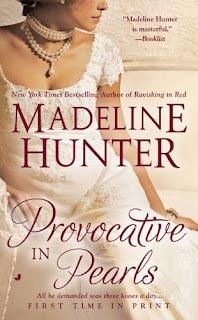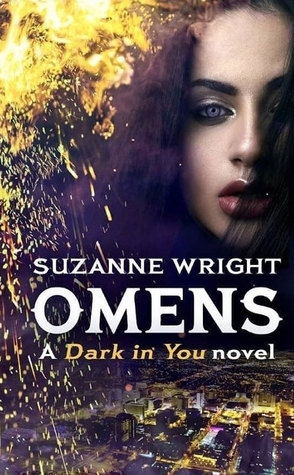 Judith’s review of Provacative in Pearls
Judith’s review of Provacative in PearlsCoerced into marrying Hawkeswell by her duplicitous cousin, Verity fled London for the countryside. With no interest in the earl’s title or status, she was willing to forfeit her inheritance in exchange for her freedom. Now that her ruse has been discovere, Verity is forced to return to a loveless marriage.
Hawkeswell strikes a bargain with Verity: in return for three kisses a day, he will not insist on his conjugal rights. But Verity discovers there are kisses . . . and then there are kisses . . . as she begins to learn the true meaning of seduction at the hands of a master.
Verity Thompson is the daughter of an industrialist who died when she was only half grown, and her care and guardianship was given into the hand of a cousin and his wife, people who were greedy and ambitious, who resented Verity’s inheriting her father’s business and his money and who are seeking to remove her from the control of her own inheritance. They treated her with disdain and cruelty and even when arranging a marriage with the Earl of Hawkeswell, an aristocrat of ancient lineage but little fortune to maintain his properties and to support his family, they essentially blackmailed her into the marriage by threatening some of her closest friends with loss of home and hearth. Following the marriage ceremony, Verity learns that her cousin has not been true to his oath and has carried out the heinous acts anyway out of shear cruelty. Since the “bargain” has been violated, Verity ran from the marriage, intending to apply for annulment and to present a financial “deal” to the Earl which would give him some of her trust fund in perpetuity in exchange for retaining her independence and influence over her father’s industrial legacy.
The Earl of Hawkesville was indeed a consummate aristocrat, but his interest in Verity’s money was not something out of the ordinary in the upper eschelons of English society, but was not for the maintenance of his rich lifestyle so much as it was for the preservation of his properties and the preservation of the livelihood of those families who had depended on his family for generations. Because Verity’s remains had never been found, she was never declared dead, so the Earl had never received any portion of Verity’s fortune. He has made no bones about his reasons for marrying, and even after finding Verity alive where she was living with friends in Middlesex, he is unwilling to allow annulment in any form. His growing desire for her and for the consummation of the marriage continues to wreck havoc with even his more philanthropic urges to grant Verity her independence. As he uncovers the truth of her cousin’s cruelty, as he becomes more and more informed about her cousin’s greed and ambition that was working against the long-term prosperity of her father’s business, Hawkeswell begins to realize that Verity is important to him for herself as a person of strength and purpose as well as one who cares deeply for her father’s employees and for the well-being of her childhood friends who had extended the only kindness she had known in her lonely growing-up years.
Madeline Hunter is a truly experienced writer who has a gift for telling a good story. This is the second in a series, and while I am only just now reading the first book, Ravishing in Red, this is not a difficult series to begin reading out of sequence. As a mark of a skilled writer, Hunter gives us books that are not only connected through the continuing stories of the characters, but she writes stories that can also stand alone on their own. The characters are believable and their presence in the story is balanced and in proportion to the other persons in the tale. Hawkeswell is a very interesting character–a man who knows his place in society but who has moved past the wildness of his early youth and takes seriously the responsibilities his title and holdings are placing on him. He feels deeply that the families who depend on him for their welfare are being made to suffer because of the bad behavior of his father and grandfather, and wants to change the direction of his life and theirs for the foreseeable future. He shows great patience with Verity, even as he seeks to change her opinion of him. His attempts to expose the perfidy of her cousin is the mark of a man who values his own honor and reputation. Under his sharp exterior lies the heart of a kind and loving man.
Verity becomes more and more likable for me as the story unfolds. At first I thought of her as just a stubborn and intractable young woman, set and determined to do “her own thing” and convinced that no person of aristocratic bent could be interested in her for any reason other than her money. She insists that Hawkeswell was in on the “con” that got her into the marriage in the first place. However, as Hawkeswell consistently and patiently refuses to allow her to run, is caring and concerned for her welfare, allows her to travel to her old home and be with her long-time friends, and acquiesces to her need to help other young women who have been misused and abused, Verity begins to experience a change in attitude toward her husband, seeing beneath his rather gruff exterior, owning up to her own rather hefty physical response to his masculinity, and ultimately allows the marriage to be consummated. There is still lots to learn about each other as their marriage moves toward a loving relationship.
Hunter has also always been so very good at giving us truly despicable bad guys. She understands that the conflict in a story is not just between the hero and heroine but can and should involve some truly evil people. And she gives us some real “baddies.” The conflict between good and evil will always pique our interest and keep a story alive, and this book is a prime example.
I like Hunter’s writing and I liked this book. It is written in the classic Regency style, but there is a freshness here that is almost always present in Hunter’s writing. Several of Verity’s friends have considerable presence in this story and will have their own stories in the future. Lovers of historical romantic fiction will find lots to like in this series and in this book in particular.
The Series:







Leave a Reply